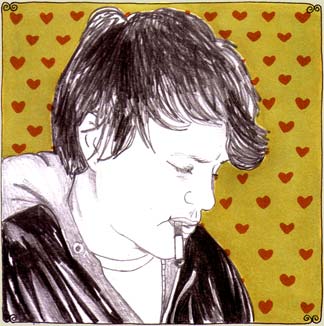- Welcome to Daytrotter
- Idiot Heart
- Three Colors
- The Mending of the Gown
Spencer Krug is a contracting and expanding cloud of surprise and mystery, thrusting his lyrical sword into many different and difficult stones, always finding the exit, the way to coax the piece of sharpened steel from the trapping rock. It is, however, with no great surprise that Spencer Krug goes ahead and throws Icarus into his swirling, basher of a new song – just one of his more overt mythological references. He sings – in that provocative, apocalyptic way that he does with sweetened venom and lightning bolts, a human version of the Aurora Borealis – that you can’t settle down until you get all of the Icarus drowned out of your blood. This is after you’ve already boiled all of the idiot out of that same blood – two preservatives that perform similar functions on the body, the vessel.
The story of Icarus is a familiar one – the imprisoned boy and his father seek to the air for escape, using wings (sometimes constructed out of wax and sometimes out of paper and glue), but the cocky-ass Icarus ignores his father’s anguished pleas not to get too close to the sun for the wings will melt or the glue loosened. Icarus does so anyway, sees his wings disintegrate and he falls into the sea, taken under by cruel waves and perishes. It’s a lessoned learned, or was it? Those who die as a direct result of their actions never learn a damn thing. The lights go out and that idiot/Icarus blood stays as thick and as stubborn as it always had been – moving the muscles and running the organs with the same agenda. The story of Icarus – while largely about stupidity and an inflated sense of control and wisdom – is just as much about a boy wanting to get to somewhere further beyond what anyone wanted to suggest was possible. He was Amelia Earhart, the Wright Brothers and Roger Bannister, little Icarus was, a dreamer, albeit a foolish one, disobeying simple laws of nature and construction limitations. He was someone who thought he needed to be somewhere else and thought that he knew how to get there, without any real proof. As a mythological character, he’s one of the lesson objects that’s so close to man and yet his tale is one of gigantic proportions, living on through time since we received it from Ovid and Apollodorus.
Krug creates these lost and confused sorts frequently – first in his two solo Rubdown releases and since with a band on last year’s Shut Up I Am Dreaming and this year’s epic return, Random Spirit Lover. He doesn’t do this alone as there is no finer band in the world right now where the creative contributions are as important and striking as the ones that drummer Michael Doerksen, guitarist Jordan Robson-Cramer and keyboardist Camilla Wynn Ingr provide. But Krug is the Ovid and the Dante, writing characters that become – upon the second, third and tenth listens – latter-day figures that could have been stars and starlets in ancient Greek literature. Many of the people he creates are adrift in their head spaces, lusting for this or that and then momentarily losing sight of those certain things and lusting for those that are completely opposite. This surfing from one to the other never really gets settled as the longing for both or for nothing like the two choices just gets louder.
The characters that Krug brings to us in these songs of stupendous depth and agitated beauty – they’re all palaces with innumerable corridors and swinging bookcases, these songs – call for effort and for attention. They aren’t like the girl Tom Petty sings about in “Free Fallin'” where we know everything about them, how they love their mamas, horses and are crazy about Elvis. These characters are jigsaw puzzles with five important pieces missing, giving you the quill and the ink to form with your own brainpower.
Reading about Jerry Garcia recently, what struck most resolutely was how the Grateful Dead leader refused to work in definitives, but instead worked in maybes, allowing listeners/stoned out Deadheads to go figure. He built songs with more than enough room for letting them carry you. Krug’s characters aren’t sure about many things and that’s a similar idea. It opens up space. They’ve reached that point in life where they can’t be aloof anymore, but they’re still unsure about directions, thinking in circles and delicious riddles. Krug sings, “Now I was never much of a dancer/But I know enough to know you’ve gotta move your idiot body around,” in “Idiot Heart” and it’s an indication that all of these conversations that crop up in his lyrics are helping his characters learn, even if they’re still lost.
